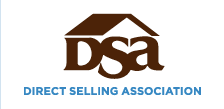| DSA (US) Logo (Photo credit: Wikipedia) |
- FHTM is NOT a member of DSA (supposedly they applied for 3 years, denied 3 years, and decided not to try again in 2011)
- DSA knew something's wrong with FHTM which is why they never were admitted. There were several requests for changes from the DSA, but FHTM never did them.
Some industry members were not happy. Kevin Thompson, of Thompson and Burton, i.e. "The MLM Attorney", essentially concluded that because FHTM is not a part of DSA, DSA basically "rolled them under the bus".
The question that needs to be answered are:
- Is DSA only answerable to its members?
- Should DSA be speaking out against scams BEFORE they become popular?
Answering the two questions...
Should DSA only answer to its members? In my opinion, the answer is yes. DSA is the closest thing there is to a "guild" or a "union" of MLM / DS / NM companies. A union is a two-way street. While it protects the rights of its members, it also protects the public from unscrupulous companies by some sort of certification process. However, being a member of DSA does NOT prove it's not a scam. Equinox International being a prime example (shut down by FTC after being Inc's #1 fastest growing company).
Which leads us to the second question... should DSA be speaking out against scams before they become popular? One of the biggest criticism against DSA is it mainly exists as a lobby group to fight the FTC and congress on proposed legislation governing that industry, rather than really helping the industry to pick out the outright scams.
And here I will make a criticism of the FTC... its position has shifted somewhat since the Amway decision back in 1979. This could be a part of DSA's lobby efforts (several FTC top officials were former lawyers involved in MLM defense) and FTC itself has no "line in the sand" that clearly defines what's legal and what's illegal. It's one huge gray area.
DSA and MLM lawyers such as Kevin Thompson and Jeff Babener have called FTC enforcement as "trial by ambush", basically shut down a company with NO chance to appeal, so a company doesn't even know it's under investigation and given a chance to fix itself. It's pretty much "out of the blue" "bang you're dead". And given such a large gray area, a company *could* have slipped over this invisible line and became illegal without knowing it.
FTC's position apparently is that they cannot give a CLEAR definition like a percentage because pseudo-MLM scams will just go right up against the limit through some accounting or legal trickery.
The problem here then is... where is the DSA in all this? DSA's primary efforts in recent years seem to be attempting to lobby individual states to accept "self-consumption" as legal and permitted, even though it appear to violate the Omnitrition decision (which clarified the Koscot decision). That is EXPANDING the gray area, not shrink it as it *should* be doing.
Why should DSA shrink the gray area? Because MLM needs self-regulation. FTC's prior cases shows that there is a clear definition of pyramid scheme, though modern variations and complicated comp plans have obscured the determinator, and FTC, being careful, have gone after the OBVIOUSLY BAD ACTORS, where 90+% of affiliates lose money and very little retail (less than 10%) were sold. DSA, instead asking for more transparency from the companies (to prove their innocence and to shrink the gray area, appears to be making things WORSE by shooting down the "business opportunity disclosure proposed legislation". This will leads to even MORE FTC prosecutions. And FTC has gotten busy, with FHTM being the latest example.
DSA's "code of ethics" is a decent start, but it's not enough. It needs to teach people how to read income disclosure statements, compensation plans, and so on and so forth. If FTC refuse to draw the line, then DSA needs to draw it for the entire industry. And it needs to speak out against members who are not following their guidelines, conduct periodic audits of its members, explain WHY certain prospective members were denied, and even speak out against non-member scams BEFORE they made the news.
In other words, DSA needs to act like a leader, or else the government will lead, and DSA and MLM industry may not like where the government is going.
If DSA does not do so, then it should not complain about FTC making unclear rules.







No comments:
Post a Comment